|
|
|
Sort Order |
|
|
|
Items / Page
|
|
|
|
|
|
|
| Srl | Item |
| 1 |
ID:
129320
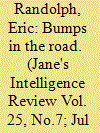

|
|
|
| 2 |
ID:
121770
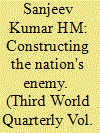

|
|
|
|
|
| Publication |
2013.
|
| Summary/Abstract |
This paper aims to investigate how in contemporary India the process of 'othering' of the Muslim minority has been the product of politically motivated and manipulated majoritarian cultural assertiveness, reflected in the Hindu right's clamour to underline the significance of drawing the geographic and cultural boundaries of what its ideologues call the Hindu nation. Situating cinema as a crucial distribution source of popular culture, the paper contends that Bollywood cinema has exhibited an overt bias towards producing films that capitulate to this radical nationalist discourse professed by the Hindutva ideologues. Making a discourse analysis of selected films produced by Bollywood since the 1990s, the premise of this contention is interrogated by examining how Hindi cinema's portrayal of the image of Muslims has been carried out in a pejorative manner which stems from the strong grounding of its stories in a Hindu majoritarian setting. The paper concludes by arguing that, with such a penchant, Bollywood cinema has actively engaged in the politics of nationalism engendered by the right-wing neo-fundamentalist Hindutva movement.
|
|
|
|
|
|
|
|
|
|
|
|
|
|
|
|
| 3 |
ID:
188603


|
|
|
|
|
| Publication |
Orlando, Harcourt Brace and Company, 1998.
|
| Description |
xi, 195p.pbk
|
| Series |
Case Studies in Cultural Anthropology
|
| Standard Number |
0155019708
|
|
|
|
|
|
|
|
|
|
|
|
Copies: C:1/I:0,R:0,Q:0
Circulation
| Accession# | Call# | Current Location | Status | Policy | Location |
| 060284 | 951.004941/GLA 060284 | Main | On Shelf | General | |
|
|
|
|
| 4 |
ID:
052196
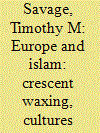

|
|
|
|
|
| Publication |
Summer 2004.
|
| Summary/Abstract |
If Europe and its Muslim communities fail to reach an accommodation, increased social strife, national retrenchment, and potentially significant civil conflict are likely to overwhelm the vision of a continent that is whole, free, and united.
|
|
|
|
|
|
|
|
|
|
|
|
|
|
|
|
| 5 |
ID:
162868


|
|
|
| 6 |
ID:
189419
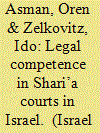

|
|
|
|
|
| Summary/Abstract |
The activity of the Shari’a Court in Israel reflects a complex reality of ‘legal hybridity’. The Muslim tribunal serving the traditional Arab community is influenced by local circumstances and processes of internal change alongside the influence of Western modern culture. As a result, legal rulings and Shari’a terms that may sometimes express conservative perceptions operate alongside general state law that may sometimes reflect other perceptions. In this article, decisions of Shari’a courts in Israel are examined on questions of ‘legal competence’ in a sample of 24 cases from four Israeli local Shari’a courts as well as a couple of decisions from the Shari’a Court of Appeals (between 1993 and 2009). In view of competence being a key legal issue, examining the court decisions on this issue makes it possible to examine the complexity of the application of Israeli law and Shari’a law within a system of courts that on the one hand, are integral to the state’s formal legal system while on the other they see themselves as representatives of the Muslim minority and its culture.
|
|
|
|
|
|
|
|
|
|
|
|
|
|
|
|
| 7 |
ID:
052491
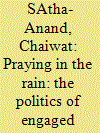

|
|
|
|
|
| Publication |
June 2004.
|
| Summary/Abstract |
In this article the author examines the anti-war protest on March 26, 2003, in Southern Thailand and suggests the notion of engaged Muslims as a theoretical alternative to political Islam to better reflect both a realistic Muslim perspective and a critical understanding of what constitutes 'the political'. Such an alternative, when it exists, depends on the ways in which a Muslim minority, such as in Thailand, chooses to engage with others in a manner that could reflect a reaffirmation of membership in the imagined community that is the nation-state, while preserving their identity as those who belong to their distinctive community of faith. In protesting for peace and symbolically 'praying in the rain' as both citizens and members of a distinctive community of faith, an alternative role for Muslims in politics as engaged Muslims has been creatively explored.
|
|
|
|
|
|
|
|
|
|
|
|
|
|
|
|
| 8 |
ID:
138413
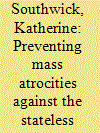

|
|
|
|
|
| Summary/Abstract |
This article constitutes a call for solutions to the prolonged and worsening plight of the Rohingya, a largely stateless, Muslim minority based in western Myanmar. Over the past year, a number of experts have invoked the possibility of genocide against this group, citing a dangerous combination of ethnic and religious tensions, discriminatory deprivation of basic rights, restricted access to food and medicine, hate speech, and large numbers fleeing the country. Yet up to now, domestic and international responses to the Rohingya crisis have been weak, with serious consequences for this community, the prospects of democratic transition and rule of law in Myanmar, and the integrity of international law. This article highlights the basis for why the possibility of genocide has been raised and argues that the international community has legal obligations to act. These considerations could contribute to sharpening focus on the urgent need for regionally coordinated solutions, based on enforceable principles of nondiscrimination and inclusion, specifically guarantees of citizenship rights and protection. These are critical elements of democratic development in divided societies like Myanmar.
|
|
|
|
|
|
|
|
|
|
|
|
|
|
|
|
| 9 |
ID:
118139
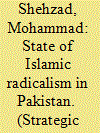

|
|
|
|
|
| Publication |
2013.
|
| Summary/Abstract |
The soil of Pakistan, because of its culture, customs, traditions, values, the temperament of the people and even state policies, provides the ideal ground for Islamic radicalism, extremism, sectarianism and terrorism. The foundation of religious bigotry and Islamic fundamentalism had been laid down in Pakistan-perhaps inadvertently-when poets like Allama Iqbal dreamt of Pakistan and the All-India Muslim League coined the term 'Two-Nation Theory' (TNT, to be read apart from an explosive that goes by the same acronym) under the leadership of Mohammad Ali Jinnah, raising the demand for a separate homeland for the Muslims of the subcontinent. At that time, the ultimate objective was to safeguard and secure the interests of the Muslim feudal lords (especially in the Muslim minority provinces of British India) and get rid of the perceived supremacy of the Hindus in a representative and democratic setup. The basic assumption that drove the demand for separation at that time was that the Muslims-namely the Shias, the Ahmadis, the Barelvis, the Ahle Hadith and the Deobandis-constituted one nation and they could not co-exist with the Hindus, the other nation.
|
|
|
|
|
|
|
|
|
|
|
|
|
|
|
|
| 10 |
ID:
153598
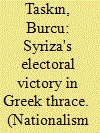

|
|
|
|
|
| Summary/Abstract |
This article, based on the link between institutional changes and voter behavior, focusing mainly on the 2015 parliamentary elections in Greece and the SYRIZA party's success in Greek Thrace, aims to understand why the Muslim minority voted significantly for SYRIZA and how they managed to send four Muslim representatives to the Greek Parliament, three of them from the same party. The article argues that, although there is massive support for radical-left SYRIZA due to its electoral promises to improve social services in addition to the party's rational candidate nomination, this support reflects a mixture of sociological and issue-voting behavior of the Muslim minority related to their motivation for political representation rather than an ideological shift. The changing political system in Greece since 2012, from a two-party to a multiparty system with decreasing voter turnout, increased the impact of the Muslim vote on electoral results in the September and January 2015 elections; however, it also increased social tension between the majority and the minority.
|
|
|
|
|
|
|
|
|
|
|
|
|
|
|
|
|
|
|
|
|